
 |
|
|
#1 |
|
Member
Join Date: Dec 2004
Location: Virginia
Posts: 520
|
I have no ideas about this sword. It obviously has been modified, maybe several times. The scabbard is a really good fit for the blade so I believe it is either original or made for this sword, the handle is not even close to what would have been on this it is crude not a good match, the blade has nice etching but the fuller is not straight as you would expect on a production blade. Here are the pictures from the seller I will post better ones soon
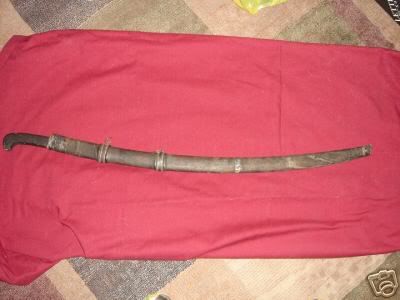 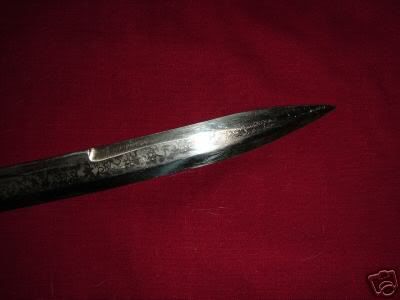 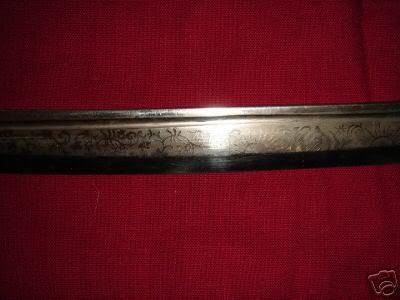 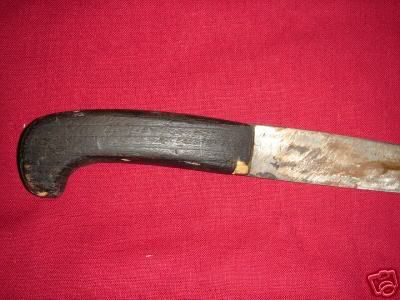 Thanks in advance for any thoughts on this |
|
|

|
|
|
#2 |
|
Member
Join Date: Dec 2004
Location: Ann Arbor, MI
Posts: 5,503
|
I remember its listing description: it stated that it was Arabian,with local traditional handle. In effect, it implied Bedouin origin (Oriental Arms has one in his Gallery and I have 4 of those).
Well, this is not a Bedouin handle: those had a 'pommel" and a "handguard" components carved and often had the handle wrapped in metal strips ). This one lacks the "handguard" and the handle looks very new. The blade is European, but it was a case with many swords from many cultures. Would be interesting to see the scabbard in greater detail:it may tell us more. Here are the pics of two of my Bedouin swords: both with local blades and horn handles. The scabbard of one of them is completely (with the exception of same age loss) covered with brass sheathing embossed in a rather haphazard fashion. Look at the percussion point of the other one: it was much used and sharpened so many times that it is about 0.5 cm narrower than the rest; must have been a '"fighter". The end of the handle at the joint with the blade is strengthened with brass reinforcements in both of them. |
|
|

|
|
|
#3 |
|
Arms Historian
Join Date: Dec 2004
Location: Route 66
Posts: 9,955
|
Hi Ariel,
Excellent photos of these interesting Bedouin sabres! I have always been intrigued by these, and have often wondered if they possibly were derived in the hilt form by Caucasian shashkas. It seems that the Oriental Arms references by Artzi attribute the to Bedouins of the Sinai, so diffusion may have expanded to other northern Arabian regions as well as Syria. The blades suggest Solingen trade blades, but may well be Caucasian products (see Elgood, "Arms and Armour of Arabia"). If Caucasian blades entered trade spheres frequented by Bedouin tribes, then possibly fully mounted shashkas also appeared here and more it seems possible that Rhys-Michaels' example may be a locally mounted version sabre from these Arabian regions, while clearly crudely fashioned. Since the distinct hilt form of the sabres known as Bedouin are so often also designated as from Sinai regions, it may be possible that a tribal smith in more remote regions could have assembled this or it may derive from regions in Arabian regions proper in the north? I have always been drawn to these rougher examples as they often were essentially ersatz weapons assembled for actual use using various captured or trade blades. The raiding and intertribal warfare of these regions well into the 20th century is well established, so this one may well have been intended for such use. It seems these tribal weapons are often the hardest to properly identify as their diffusion among nomadic tribes typically defies any distinct geographic assignment! I agree that this example does not associate visually with these Bedouin examples, but do you think the variation idea for Arabian regions is possible? Best regards, Jim Last edited by Jim McDougall; 7th August 2005 at 08:11 PM. |
|
|

|
|
|
#4 |
|
Member
Join Date: Dec 2004
Location: Virginia
Posts: 520
|
OK here are the better pictures . The OAL of the sword is 35 inches the blade is 30.25 inches
  IMG]http://img.photobucket.com/albums/v96/RhysMicheal/swords5/unknown3.jpg[/IMG]  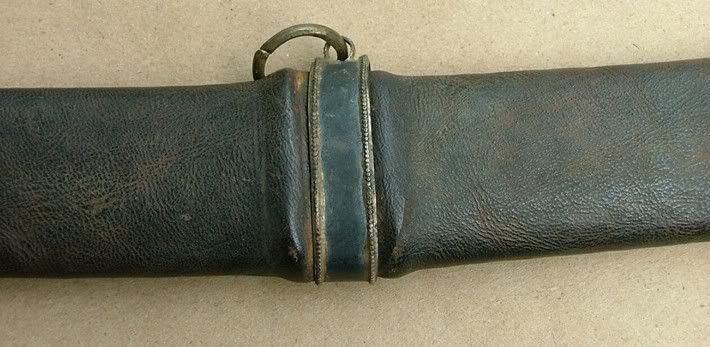 Thanks for the info so far, when I looked at the pictures before buying it I thought north african I don't really know why it struck me that way now I just have no idea |
|
|

|
|
|
#5 |
|
Member
Join Date: Dec 2004
Location: Kernersville, NC, USA
Posts: 793
|
No info, but a question. Was the sword lengthened by welding on a longer tang? It certainly is a curiosity. I watched it on Ebay as well.
 Steve |
|
|

|
|
|
#6 |
|
Member
Join Date: Dec 2004
Location: Kuala Lumpur, Malaysia
Posts: 100
|
Greetings,
I'm no sword expert but the etchings on the blade reminds me of something and this might or might be a clue to the blade's origins. If you look at the symbol between the two rising suns, the emblem somewhat resembles the top part of the Khalsa symbol of the Sikh Faith. Could it be possible that this was a European manufactured blade intended for the Indian market that has ended up elsewhere. I believe the Sikhs place a lot of importance on the martial arts and courage, which also spills into the development of symbolic ritual weapons. |
|
|

|
|
|
#7 |
|
Arms Historian
Join Date: Dec 2004
Location: Route 66
Posts: 9,955
|
Raja Muda,
Brilliant!!! That is exactly what that symbol is!!! It is the Sikh symbol interestingly known as the 'Khanda' for the representation of that type sword at the center of the symbol, and surrounded by the chakkar (steel quoit). This symbol is officially the emblem of the Khalsa, the Sikh community created to purify the Sikh tradition by Guru Gobind Singh in Anandpur, India in 1699. The blade appears to be most possibly of early 20th century, and as has been noted, for this particular market. It does not necessarily suggest that the blade was made in India, although it is quite possible that it is a product of the many manufacturers in Rajasthan still producing edged weapons. Although the Sikh faith has expanded to worldwide communities, it is interesting to consider that the particular style of guardless, shashka type mounts on this blade do not concur with traditional Sikh weapons. It does seem unlikely that a blade of this provenance would end up in Arabia, however it does seem more likely to possibly Afghan or Central Asian regions where the shashka was well known. Thank you very much for bringing up the Sikh markings!!! Extremely astute observation, and excellent assessment of the Sikh faith. All best regards, Jim |
|
|

|
|
|
#8 |
|
Member
Join Date: Dec 2004
Location: Virginia
Posts: 520
|
Steve
No signs of welding but the long ricasso confuses me also. Probably the only way to know for sure would be to remove the handle. Raja and Jim great stuff this place never fails to amaze me at the level of information the members here bring Thanks |
|
|

|
 |
|
|